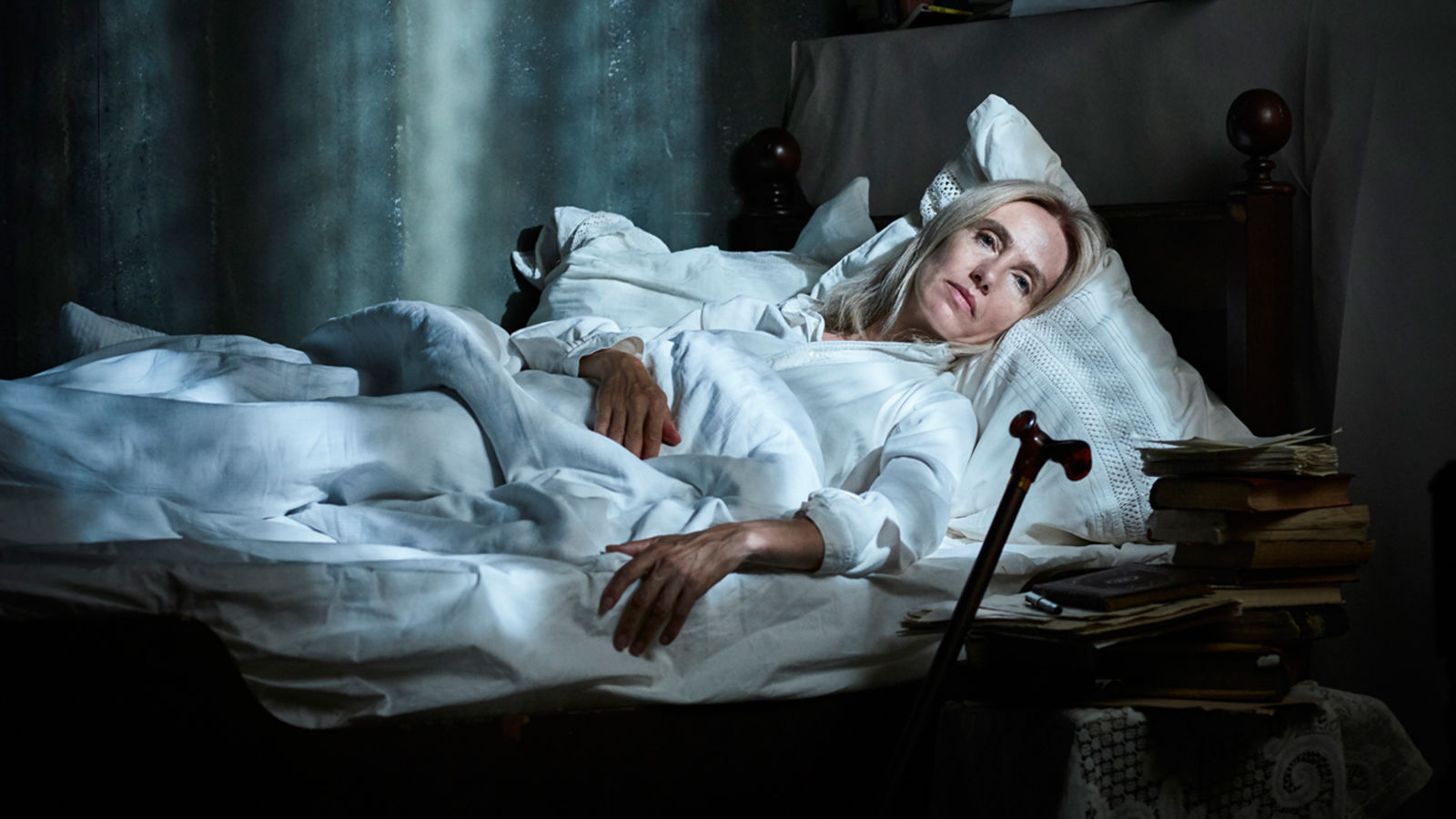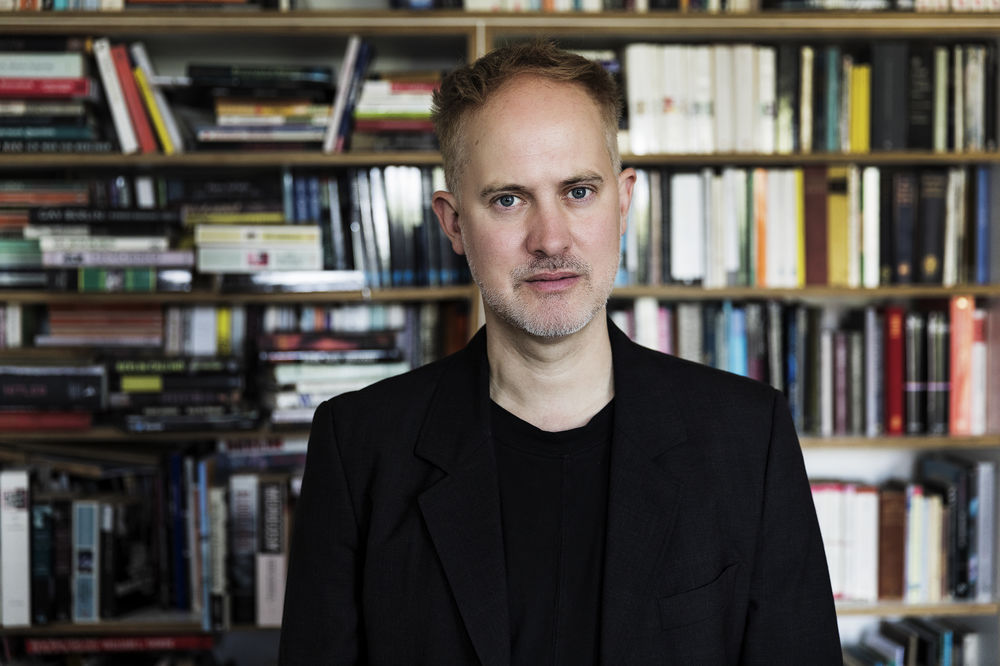
Creative Unrest: Milo Rau’s »LENIN«
by Joseph Pearson
2 October 2017
I open the door to a darkened rehearsal space. In the gloom, below darkened rafters, is a large revolving set cast in golden gaslight. A world is being created there; it’s as if we have passed through a time machine, to a dacha in Russia in the autumn of 1923. Lenin is losing grip on reality; Stalin is rising in strength. We see key moments in the historic transfer of power, ones that will decide which form of Communism – Leninist, Trotskyist, Stalinist? – will dominate in coming decades.
Classical Marxists make little of the individual’s role in history, but here we are witness to personal struggles in an intimate, domestic, retreat. As director Milo Rau tells me, »What interested me was to treat the perception of Socialism and Lenin in Western Europe and Germany, but detached from the pop-culture clichés. What were these figures like in private life?« Rau is also interested in what he calls the »internal pressure of political groups – like the RAF – that are at times fed up or paranoid. A dacha is an excellent place for these developments, because it is so claustrophobic«. We follow the video camera’s perspectivevprojected on a large screen above the building – an itinerant view that roams from a living room, to a kitchen, bedroom, bath, all peopled by numerous crew and actors. Cameras peek through doors, from one space to the next, and out to a terrace where there are night sounds. Lenin steps out of a bathtub and dries herself with a towel.
»LENIN«, premiering on 19 October 2017, is different from Milo Rau productions that have played recently at the Schaubühne. It’s on a much grander scale. »The Europa Trilogy« focused on intense individual monologues, with few actors. »Compassion« was so minimal that it had only two actors. Now, we are presented with a large cast, in a technically complicated production that makes full use of the Schaubühne’s experience developed during other challenging pieces such as Katie Mitchell’s.
Yet, there are continuities with recent Rau productions. There is the concern with documentary sources. And the highly detailed set-design is very typical of Rau. It is irresistible: I want to walk through the rooms of this world, created by designers Anton Lukas and Silvie Naunheim, during a rehearsal break, to examine close up the old newspapers lying on tables with embroidered coverings. Or a broom standing in the corner. Towels messily restacked on top of each other, above the bathtub. A bed with ruffled sheets. A typewriter on the floor by the bed. An old medical kit on a chair nearby. Books standing, threatening, on a tall shelf behind the headboard where Lenin sleeps.
Every object on set is useful in some way. Nothing is simply decorative here; »use« creates an ambiance. It becomes the aesthetic. Human utility dominates on stage as well: the dacha is not the typical retreat for relaxation for its occupants, but a functional place. Every actor seems occupied, even if simply before a chess set. The themes of the action touch on use-value as well. The Soviet leaders work through the key transitional years of the revolution from Lenin to Stalin. Individual decisions – such as whether to make public Lenin’s testament of 1922, which warns that Stalin is dangerous – rather than great social movements, will change the course of the implementation of Communist theory in the 20th century.
The rehearsal is about to start again. I find my way back to a chair in the dark, trying not to trip over cables and bump into the dramaturge. Stalin, played by Damir Avdic, sits on the terrace with a bulletproof energy that tugs at you. A screen illuminates, and I see Lenin, the ethereal face of actor Ursina Lardi. She seems to stare straight at you, but her body is mysteriously hidden elsewhere on set. She speaks of Beethoven, the Appassionata Sonata. The slow movement plays. Andante con moto. All at once, the dacha is cast in a bourgeois sheen.
Marx wrote that the bourgeoisie performs an initial, heroic role, in the early stages of revolution. That class creates the conditions for a new world to emerge. Perhaps this whole stage – of worn, bourgeois, furnishings and still-life paintings – is but a snakeskin. Does the rotating set – the constant circular motion, and the functional world there, with all its contradictions and syntheses – suggest a dialectic?
I don’t use that word loosely. Rolf Bossart, whose essay »The Name of Lenin« is important to the production, draws on the work of Boris Groys when speaking about the »creative unrest« of Leninist thinking, while »Stalin made a dogma of standstill out of the mobile dialectic of Lenin«. This dogma eventually resembles Lenin’s mummified corpse, which Stalin put on display against the wishes of the deceased’s widow. The production is, in many ways, about what the moving set is doing – a refutation of this stasis.
Can we still make politics this way? And not just theatre?
***
I sit down with Milo Rau for an interview. Milo is an un-selfconscious, forty-year old, with two kids, who doesn’t seem to take himself too seriously. He is gregarious and unafraid to smile; in fact, he beams. I have my suspicion that this is the healthiest attitude for someone working on subjects – the stuff of Rau’s International Institute of Political Murder – as difficult as justice, insurrection, migration, or genocide.
I ask Rau about the difficult subject matter of this project – the legacy of Communism – and how he sees the transition from Leninism to Stalinism.
He replies »My production of ›Compassion‹ already asks the question: if not all people are living successfully in this world, do we will limit our concern to the successful future of just a small group? Lenin asks: what are we waiting for, really: when all are not free, then nobody is free. When the revolution is not international, it hasn’t happened. That is the truth of Marxist revolution: you can’t succeed in a single land or in one party, or limit it to a small group. But this is the moment – in 1923 – that the revolutions in Germany have failed, despite some street battles still raging in Hamburg. After this failure, the Stalinist one-land revolutionary model takes over. Lenin dies, Trotsky is isolated from the party. Concern for liberation in the field of identity politics – such as the inclusion of women in positions of power – is isolated from that of class warfare. 1923 is the time when we can say that Communism has failed. From now on, there will only be a focus on Russian power-politics«.
The brutality of the Stalinism that emerged from this transition is now, for many people, the very definition of Communism. Rau does not shy away sanitising what the Soviets ultimately did to the ideology. The violence surrounding the Soviet project is, in fact, enhanced by the presence of two children on the set, who are bilingual in German and Russian. (I’d seen them earlier playing tick-tack-toe with the actors during the long rehearsal). I ask Rau about what role they play.
Rau recounts a scene from the production, »Lenin turns to a child and says he would like to shoot him, impale him with a bayonet, and throw him into a mass grave. Lenin asks ›would that be fun?‹ and the child replies, ›Yes, leader‹. There is a reason for this brutal discussion. The problem of theatre, as art, is how constantly to increase the aesthetic of terror in the face of the difficulty of translating what happens in the world, what people do, to the stage. What touches everyone is a 7-year old girl or a 9-year old boy. The presence of children – and they are amazing, and it’s only just their second day on stage – completely changes our relationship to terror. It has an immediate effect on the way adults act and how tender they become«.
Indeed, the presence of children in this environment is all the more frightening because they don’t seem to understand the brutality of what they are hearing. Yet, they will be the inheritors of a revolution gone off the rails.
But while I am quick to judge and dismiss this failure, Rau is nuanced. And here, we return to an aspect we have considered when looking at the stage set. Rau calls the world he has created »associative« in character, a world that eschews a simple message. We are still in that moment of transformation, 1923, with the revolving panels of the dacha transforming the Soviet leaders. Lenin moves from being a woman, played by Ursina Lardi, to becoming the bald and bearded icon with which we are familiar from 1930s socialist-realist films. From a world of many languages, the stage becomes eventually a monolingual place filmed in black and white. But, for now, the revolution is still in flux, and resists predictable plotting or convenient characterisations; it aims as well to resist satisfying a simple neoliberal desire which might reduce it to a message and »entertainment«.
Rau leans back and tells me that he is well beyond such market expectations: »I think it’s a shame that so often that artworks that do not have a linear narrative are judged less positively. But I’m also convinced we shouldn’t care too much«. I suggest to him that when a production looks beyond the expectations of the market, it is the moment when we paradoxically succeed because we show higher respect for audiences.
Milo Rau’s new production is, arguably, and appropriately, more Leninist than Stalinist in character (with, I’d say, an analytical-Marxist appreciation for the role of individual agency). Its associative spirit is closer to what Bossart calls »Lenin’s thought and action that works strategically with all contradictions, and brings them into extreme positions, resulting in maximum freedom and mobility in the options of political action. But also a maximum instability and destructive restlessness.« And then the set revolves once more – to the sound of a ticking clock held up to the ear of a child – and we are swept into the future.
Interview in German, all translations by Joseph Pearson.
LENIN
by Milo Rau & Ensemble
directed by: Milo Rau
> STREAM
Premiered on 19 October 2017
Mit dem Aufruf des Videos erklären Sie sich einverstanden, dass Ihre Daten an YouTube übermittelt werden. Mehr dazu finden Sie in unserer Datenschutzerklärung.
Bei Klick auf die Schaltfläche "Akzeptieren" wird ein Cookie auf Ihrem Computer abgelegt, so dass Sie für die Dauer einer Stunde, diese Meldung nicht mehr angezeigt bekommen.
Pearson’s Preview

Archive
April 2023
FIND 2023
Kuro Tanino at the Sea’s Edge
»Fortress of Smiles» at the Schaubühne’s 2023 FIND Festival
September 2021
»LOVE« Stripped Down
Alexander Zeldin at FIND 2021
| Page 2 of 10 pages |
